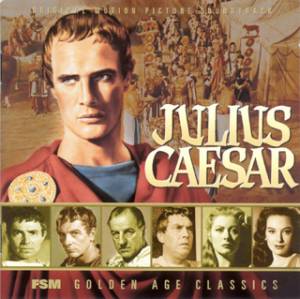Julius Caesar
Music composed and conducted by Miklós Rózsa
Available on Film Score Monthly FSM Vol 7, No.9
Running time: 68.07
Purchase from: FSM Vol 7, No.9
Film Score Monthly, 8503 Washington Boulevard, Culver City, CA90232; Tel: 1-888-345-6335; overseas: 310-253-9595; fax: 310-253-9588 e-mail:Info@filmscoremonthly.com

See also:
To quote Film Score Monthly's press release:
"M-G-M's 1953 Julius Caesar is one of the finest screen adaptations of William Shakespeare, featuring a stellar cast in Marlon Brando, James Mason, John Gielgud, Louis Calhern, Edmond O'Brien, Greer Garson, Deborah Kerr and more. The film was produced by John Houseman and directed by Joseph Mankiewicz, filmed in stark black-and-white and using no additional dialogue beyond Shakespeare's text.
Scoring Julius Caesar was M-G-M's premiere dramatic composer, Miklós Rózsa, who faced a unique challenge. The story is set in Roman times, yet musical fidelity to ancient Rome would be inappropriate for a Shakespearean tragedy with its origins in the Elizabethan era. At the same time, evoking stage music of 16th century England would have also been wrong. Rozsa instead decided to score the film as a universal drama: 'I wrote the same music I would have written for a modern stage presentation: interpretative incidental music, expressing with my own musical language, for a modern audience, what Shakespeare expressed with his own language, for a modern audience 350 years ago.'
I see no reason to disagree with any of that, and it neatly explains why the music is as it is, falling somewhere in style between Miklós Rózsa's film noir style (the dark intensity of Lost Weekend, The Killers and Brute Force) and the faux Roman Empire pomp of he would later become inseparably associated with via such epics as Ben-Hur and King of Kings. At the time of composition Rózsa had made only one previous excursion into such territory, for MGM's 1950 epic Quo Vadis, for which he composed one of the greatest scores in cinema history. With Quo Vadis Rózsa invented the sound we – at least until Hans Zimmer re-imagined it for Gladiator – associate with the Roman Empire; all regal pomp, blazing brass marches and pounding drums.
There's some of that grandeur here, for instance in 'Caesar's Procession', a bold ceremonial the equal of the composer's more famous, later imperial marches. There is also exotic choral writing in a cue such as 'Nenia' which one might associate with Quo Vadis, a noble, aristocratic epic quality to the gradual build in intensity of 'Black Sentence' and a distinctly imperial quality to the brass writing of 'Enter Cassius' and 'Most Noble Brutus'. There are more such examples through out the score. Yet Julius Caesar isn't a 1950's Hollywood epic, but an adaptation of a Shakespeare play which almost incidentally has the same Roman setting with which Miklós Rózsa would become so associated. As Film Score Monthly's press release continues:
"The resulting score is one of Rozsa's most powerful, shot through with dark and dramatic moods but a constant sense of melody. The score's twin main themes evoke the characters of Caesar (Calhern) and his disciple Mark Antony (Brando), who receive a martial and stern material; and Brutus (Mason), the pivotal character in the play, who is given more reflective throughline. The two themes dominate the score, finally merging in the climactic music. Rozsa also provides secondary thematic material for Cassius (Gielgud) and specific dramatic moments; as well as judicious Roman marches and source cues (including haunting use of voice)."
Besides orchestral writing of dark-hued power – 'Ghost of Caesar' is ice cold and resolutely 20th century in its impact - Rózsa offers a setting of John Dowland's song 'Now, Oh Now, I Needs Must Part', first published in 1597, and which might well have been known to Shakespeare. Much of the score is sombre psychological underscore, such that the brief 'Battle of Philippi' wherein the composer unveils his patent full scale Roman combat music may come as something of a shock. The nine minute finale, comprising five short cues, has a brooding power, fatalistic dynamism and grandeur to stand beside the composer's best work.
As the FSM press release concludes:
"This CD features Rozsa's complete score to Julius Caesar, including a comprehensive bonus section of alternate versions and pre-recordings. Unfortunately, while the film itself is in stereo, only monaural session elements survive for Rozsa's classic score. The climactic "Caesar, Now Be Still" is at least presented in stereo, due to fact that its various components were recorded as overdubs; and the film's "Preludium" and "Finale" are duplicated as bonus tracks in stereo from the finished film's soundtrack. Liner notes interpolate Rozsa's own comments on the score."
The booklet notes are first rate, and the presentation is as usual for FSM, impeccable. While the bonus tracks are really only for the sake of completeness, this is an excellent presentation of a major score. The sound is somewhat limited, and sadly mostly in mono, but this should not put off serious collectors.
Gary Dalkin
41/2
Track List:
- 01: Overture 3:04
- 02: lireludium/Idle Creatures 2:57
- 03: Caesar's lirocession 2:40
- 04: Flavius Arrested/Feast of Luliercal/Flourishes/Caesar and His Train 1:56
- 05: Scolding Winds/Brutus' Soliloquy/Brutus Awake 7:11
- 06: Brutus' Secret/They Murder Caesar 2:17
- 07: Warning of Artemidorus/Ides of March 4:01
- 08: Nenia/Black Sentence/Brutus' Camli/Enter Cassius 6:05
- 09: Heavy Eyes/Now, Oh Now I Needs Must liart/Gentle Knave/Ghost of Caesar 4:21
- 10: Most Noble Brutus/Cassius' Farewell/Cassius' Deliarture/lirelude to Battle/Battle of lihillililii 3:05
- 11: Titinius Enclosed/Caesar Revenged/Caesar, Now Be Still/Rites of Burial/Finale 9:17
Total Time: 47:23
Bonus Material:
- 12: lireludium (stereo)/Idle Creatures (alternate) 2:57
- 13: Roman Holiday (lire-recording) 0:40
- 14: Scolding Winds (short version)/Brutus' Soliloquy (short version) 3:15
- 15: Nenia (short version)/Black Sentence (film version) 2:53
- 16: Black Sentence (short version) 2:04
- 17: Nenia (lire-recording) 3:39
- 18: Black Sentence (intermediate version) 2:51
- 19: Now, Oh Now I Needs Must liart (lire-recording) 1:07
- 20: Finale (stereo) 0:56
Total Time: 20:41
Total Disc Time: 68:03
Return to Index